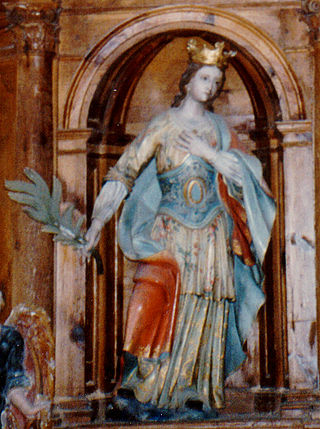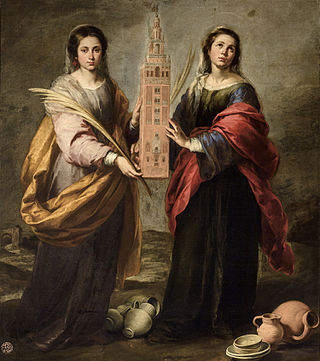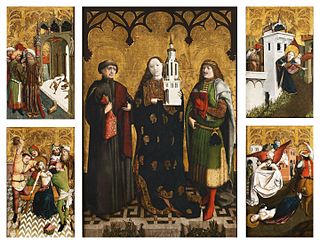
Saint Lawrence or Laurence was one of the seven deacons of the city of Rome under Pope Sixtus II who were martyred in the persecution of the Christians that the Roman emperor Valerian ordered in 258.

Agathaof Sicily is a Christian saint. Her feast is on 5 February. Agatha was born in Catania, part of the Roman Province of Sicily, and was martyred c. 251. She is one of several virgin martyrs who are commemorated by name in the Canon of the Mass.

The Cathedral of Saint Mary of Burgos is a Catholic church dedicated to the Virgin Mary located in the historical center of the Spanish city of Burgos. Its official name is the Holy Metropolitan Cathedral Basilica Church of St Mary of Burgos.

Columba of Spain was a virgin and nun who was born in Córdoba, Spain, and martyred around 853 by the Muslim rulers in Spain, during a persecution of Christians. She is a part of the Martyrs of Córdoba and venerated as a saint in the Catholic Church. Her feast day is September 17. Her cult was probably a combination of two virgin martyrs, Colomba of Spain and Columba of Sens, a third century French martyr.

Susanna of Rome was a Christian martyr of the Diocletianic Persecution. Her existing hagiography, written between about 450 and 500 AD, is of no historical value and the relations it attributes to Susanna are entirely fictitious. It is probable that a real martyr named Susanna lies behind the literary invention.

Saints Justa and Rufina (Ruffina) (Spanish: Santa Justa y Santa Rufina) are venerated as martyrs. They are said to have been martyred at Hispalis (Seville) during the 3rd century.

Saint Praxedes, called "a Roman maiden", was a saint and virgin who lived in the Roman Empire during the 2nd century. Along with her sister, Saint Pudentiana, she provided for the poor and gave care and comfort to persecuted Christians and martyrs. Her veneration began in the 4th century and many churches have been dedicated to her.

The Archdiocese of Burgos is Latin Metropolitan sees of the Catholic Church in Spain.

Saint Leocadia is a Spanish saint. She is thought to have suffered martyrdom and died on December 9, ca. 304, in the Diocletianic Persecution.

Saint Cucuphas is a martyr of Spain. His feast day is 25 July but in some areas it is celebrated on 27 July to avoid conflict with the important feast day of Santiago, the patron saint of Spain. His name is said to be of Phoenician origin with the meaning of "he who jokes, he who likes to joke."

The designation artede (la) repoblación was first proposed by José Camón Aznar in 1949 to replace the term Mozarabic as applied to certain works of architecture from the Christian kingdoms of northern Spain between the end of the 9th and beginning of the 11th centuries. Camón argued that these buildings were related stylistically to the architecture of Asturias and owed little to Andalusian styles. Moreover, since they were built by Christians living under Christian rule, neither were they Mozarabic.

Marina of Aguas Santas was a Christian virgin martyr from Aguas Santas, in the province of Ourense. The story of her life as it has been preserved is a mixture of fact and legends.
During the Spanish Civil War Catholic people faced persecution from the Republican faction of the war, in part due to their support of the nationalists and the recently abolished monarchy. The Catholic Church venerates them as martyrs. More than 6,800 clerics and other Catholic people were killed in what has been dubbed the Red Terror. As of November 2023, 2,127 Spanish martyrs have been beatified; 11 of them being canonized. For some 2,000 additional martyrs, the beatification process is underway

The Passionist Martyrs of Daimiel were a group of priests and brothers of the Passionist Congregation killed by anti-clericalist forces during the Spanish Civil War.

Cubillo del Campo is a municipality located in the province of Burgos, Castile and León, Spain.

Engratia is venerated as a virgin martyr and saint. Tradition states that she was martyred with eighteen companions in 303 AD.
The Martyrs of Turón is the name given by the Catholic Church to a group of eight members of the De La Salle Brothers, a Catholic religious-teaching congregation, and one Passionist priest who were executed by insurrectionists in Turón in Asturias, Spain in October 1934. The Martyrs of Turón were killed by far-left rebels for their religious activities during the Asturian miners' strike of 1934 of the Revolution of 1934. They were canonized in 1999 by Pope John Paul II.

Saint Barbara, known in the Eastern Orthodox Church as the Great Martyr Barbara, was an early Christian Greek saint and martyr. There is no reference to her in the authentic early Christian writings nor in the original recension of Saint Jerome's martyrology.

Saint Venera is venerated as a Christian martyr of the 2nd century. Little is known of this saint. The date of her death is traditionally given as July 26, 143 AD.

















